|
|
|
Sort Order |
|
|
|
Items / Page
|
|
|
|
|
|
|
| Srl | Item |
| 1 |
ID:
155690
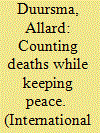

|
|
|
|
|
| Summary/Abstract |
This article assesses the Joint Mission Analysis Centre's (JMAC) field information and analysis capacity through systematically comparing JMAC's data collection in Darfur to an event-level conflict dataset based on open-source information. This comparison shows that JMAC's data collection in Darfur over the studied period is much more comprehensive and precise than any publicly available data on conflict events currently available. In addition, this article demonstrates how peacekeeping data could be used to guide the leadership of peacekeeping missions.
|
|
|
|
|
|
|
|
|
|
|
|
|
|
|
|
| 2 |
ID:
155685


|
|
|
|
|
| Summary/Abstract |
The emergence of ‘big data’ and calls for ‘evidence-based decision-making’ to increase the effectiveness of peacekeeping, humanitarian, and development programming have resulted in an often-unadulterated embrace of the promise of data as a solution to a diverse set of problems facing these sectors. At the same time, however, the increasing and widespread collection of data – by researchers, policymakers, and operational actors – directly contrasts with the sense that data are often collected yet not used. Taking a step back, this article examines the epistemologies of data collection and use from the perspectives of the scholar/researcher, and the practitioner/operational actor to illustrate how these perspectives elicit a series of data divergences. I argue that the collection and use of data replicate and are poised to extend the theory-practice divide that exists between researchers who study violence – those working ‘on’ conflict – and the peacekeepers, peacebuilders, and aid workers who work ‘in’ the midst of it. Differing conceptions of the purpose and use, sources and characteristics, and time frames of data reflect role-based positionalities that shape practices of collection, affect their interoperability, and limit their possible use, even as combining these types of data could also address their inherent limitations.
|
|
|
|
|
|
|
|
|
|
|
|
|
|
|
|
| 3 |
ID:
155688
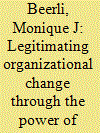

|
|
|
|
|
| Summary/Abstract |
While humanitarian work has always implied a certain level of risk, in the last two decades there has been a growing concern that humanitarian and peacekeeping agents are exposed to unprecedented levels of insecurity. To determine whether or not such claims and perceptions are substantiated, researchers have developed quantitative datasets aimed at measuring and tracking threats to humanitarians and peacekeepers at the global level. In contrast to humanitarian practitioners which use such quantitative expertise to suggest aid work is becoming increasingly dangerous, the producers of quantitative representations of humanitarian security suggest instead that attack rates have remained for the most part fairly stable despite increases in absolute numbers. In order to make sense of this paradox, this article draws on neo-Bourdieusian approaches, the sociology of professions and organizations, as well as global governance literature on quantification to suggest that such inconsistencies relate to the use of quantitative data to legitimate organizational change and bureaucratic restructurations in relation to the institutionalization of security expertise. By understanding the dynamics of organizational change, this article sheds light on one of the ways through which international humanitarianism and peacekeeping is shifting from a paradigm of proximity to a paradigm of distance and remoteness.
|
|
|
|
|
|
|
|
|
|
|
|
|
|
|
|
| 4 |
ID:
155686
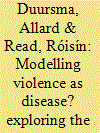

|
|
|
|
|
| Summary/Abstract |
This article explores the potential and limitations of epidemiological analyses of violence. We draw on an 18-month sample of Joint Mission Analysis Centres data to identify clusters of armed violence in Darfur and model the risk of armed clashes in space and time. We illustrate the merit of using methods from both descriptive epidemiology and analytical epidemiology to study armed conflict. We observe three interesting correlations. Firstly, that violence in one locality means it is more likely that there will be violence in a neighbouring locality in the next month. Secondly, that the presence of peacekeepers in a locality where violence has occurred means it is less likely that violence will occur in a neighbouring locality, than if peacekeepers were not present. Finally, our third observation is that the presence of peacekeepers in a given locality means it is more likely that violence will occur in that locality. Understanding how conflict occurs in space and time could contribute to the effectiveness of peacekeeping missions. This touches upon the major commonality between the efforts of peacekeeping missions and epidemiology: both are fundamentally concerned with the well-being of defined populations and both rely on data to design effective interventions.
|
|
|
|
|
|
|
|
|
|
|
|
|
|
|
|
| 5 |
ID:
155684
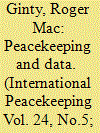

|
|
|
|
|
| Summary/Abstract |
Consider the following scenario: a violent incident occurs in rural Darfur. Four men are killed, and three are injured, when a settlement is attacked by unknown assailants. One woman and a child are reported missing. Three huts are burned and livestock is taken away. An African Union-United Nations Mission in Darfur (UNAMID) patrol 15 kilometres away is alerted to the incident but it cannot travel to the scene for 48 hours because the Government of Sudan police say the area is too dangerous. The UN's movement control officer agrees with this assessment. The UN patrol leader reports the incident back to his commander and thus the incident, once logged, becomes official.
|
|
|
|
|
|
|
|
|
|
|
|
|
|
|
|
| 6 |
ID:
155689


|
|
|
|
|
| Summary/Abstract |
In recent years, the difficulty of researching with conflict-affected populations, coupled with the demand for up-to-date and accurate knowledge about the dynamics of conflict on the ground, has led many organizations working in conflict-affected states to turn to mobile and internet technology to find solutions to peacekeeping problems. While acknowledging that new technologies can be of use to peacekeepers seeking to gain a better understanding of the conflicts that they operate in, this article warns against an over-reliance on remotely gathered conflict data. Through a comparative analysis of the author’s own experiences of carrying out both ethnographic fieldwork and utilizing crowdsourcing technologies, this article critically evaluates crowdsourcing’s uses and abuses. It argues that while crowdsourcing may be a useful supplement to knowledge gained from sustained and embedded engagement in the field, it can never be a substitute. Furthermore, an over-reliance on remotely gathered data can end up reifying simplistic or misleading understandings of the drivers of conflict, and promoting elite interests at the expense of the marginalized voices it claims to make visible.
|
|
|
|
|
|
|
|
|
|
|
|
|
|
|
|
| 7 |
ID:
155687
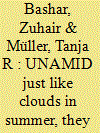

|
|
|
|
|
| Summary/Abstract |
Based on fieldwork carried out as part of the Making Peace Keeping Data Work for the International Community Project, this article considers how local perceptions of conflict dynamics interact or fail to interact with incident reporting in UN peacekeeping missions. Interrogating encounters of the hybrid United Nations/African Union Mission in Darfur (UNAMID) with local populations through interview data collected among Darfurian refugees in Chad, the article posits that localized perceptions of conflict differ in important ways from interpretations by UNAMID. It further argues that in order to effectively carry out the core mandate of protecting civilians, the systematic inclusion of local knowledge into UN-produced data sets is vital for any UN peacekeeping mission.
|
|
|
|
|
|
|
|
|
|
|
|
|
|
|
|
|
|
|
|
|